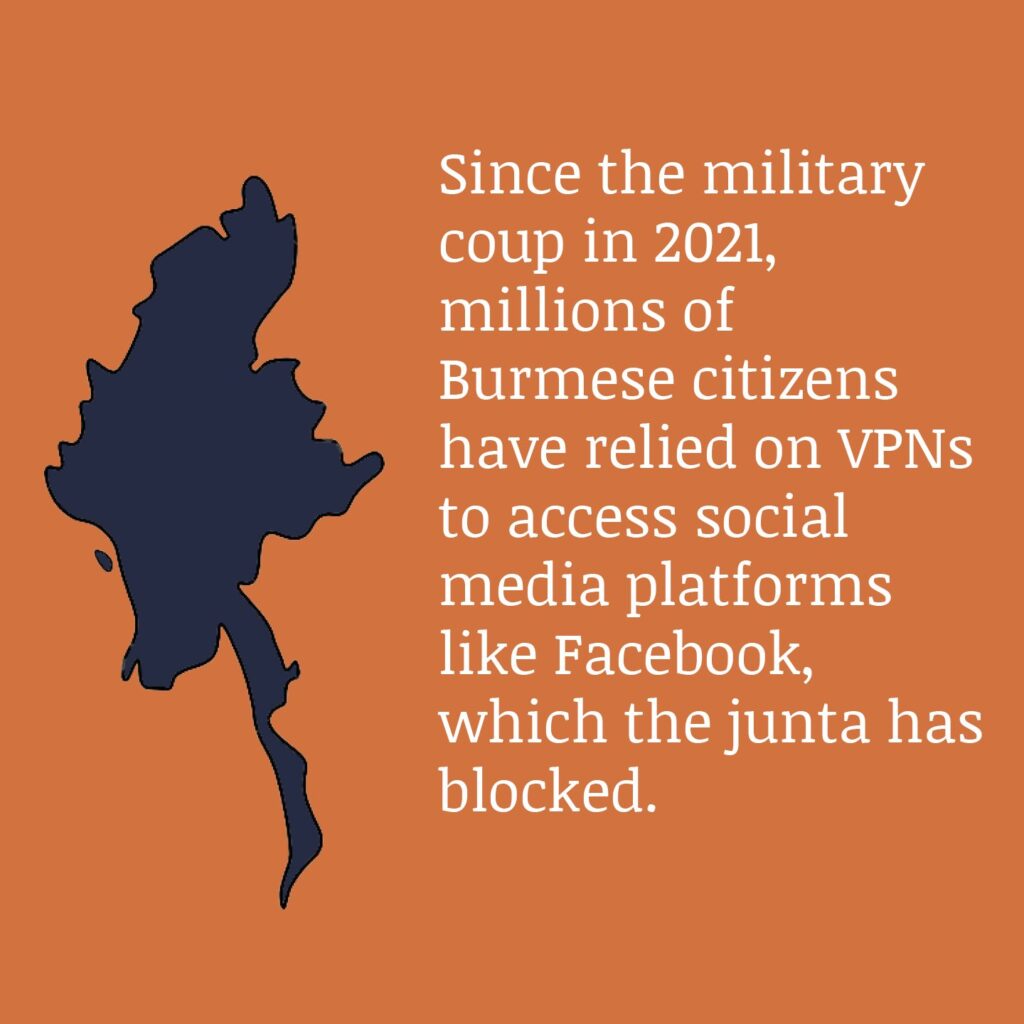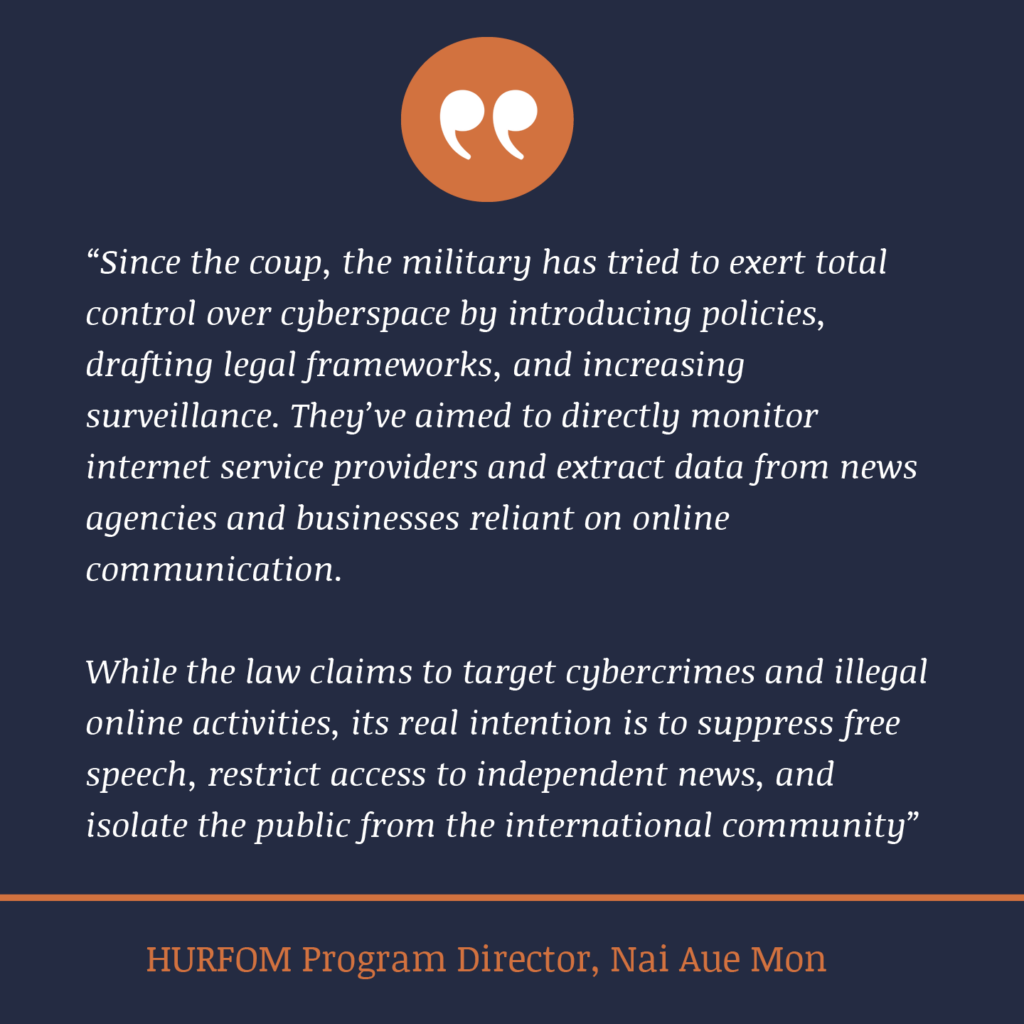Junta Implements Cybersecurity Law with Severe Penalties for VPN Use and Online Infractions
January 3, 2025
On January 1, the junta officially enacted Cybersecurity Law No. 1/2025 under Article 419 of the Constitution. The law comprises 16 chapters and 88 articles outlining severe penalties for unauthorized VPN use and various online offences, including fines and imprisonment.
The law mandates penalties of up to six months in prison and fines of up to 20 million kyats for those caught using VPNs without approval. It also includes penalties for cybercrimes such as online fraud, illegal gambling, and unauthorized financial transactions, with prison sentences ranging from two to seven years and significant fines.
The junta claims the law aims to protect national stability and authority by preventing cyberattacks and ensuring control over digital spaces. However, local legal experts and rights groups have raised concerns that the law primarily targets free expression and access to information.
A legal expert from Mawlamyine commented:
“The VPN law is being misused to control public narratives. The Junta is more interested in restricting independent information flow rather than focusing solely on legitimate cybersecurity concerns.”
The law includes provisions for confiscating devices and materials used in alleged cybercrimes as state property, adding another layer of control.
Since the military coup in 2021, millions of Burmese citizens have relied on VPNs to access social media platforms like Facebook, which the junta has blocked. In late 2024, the junta escalated its crackdown by deploying Secure Web Gateway (SWG) technologies, reportedly with support from Chinese tech firms, to strengthen digital surveillance and block VPN access. Despite this, many residents continue to use VPNs, risking searches and extortion at security checkpoints.
Nai Aue Mon, Program Director of the Human Rights Foundation of Monland (HURFOM), provided his perspective on the junta’s cybersecurity policies:
“Since the coup, the military has tried to exert total control over cyberspace by introducing policies, drafting legal frameworks, and increasing surveillance. They’ve aimed to directly monitor internet service providers and extract data from news agencies and businesses reliant on online communication. While the law claims to target cybercrimes and illegal online activities, its real intention is to suppress free speech, restrict access to independent news, and isolate the public from the international community. People have been forced to rely on VPNs due to successive information blackouts. The Junta’s response has been arbitrary arrests, extortion, and lengthy prison sentences, all of which violate fundamental human rights.”
Nai Aue Mon highlighted that in free and democratic nations, cybersecurity laws are designed to protect citizens’ rights rather than curtail them:
“In free countries, cybersecurity regulations ensure the right to information, freedom of expression, and digital safety. These laws protect the public, not oppress them. The junta’s cybersecurity law, however, is a deliberate attempt to sever the people’s connection to the world and hide their atrocities—such as indiscriminate airstrikes and the use of advanced weaponry against civilians from global scrutiny.
The United Nations Human Rights Council has repeatedly condemned laws that excessively restrict online freedoms and called for the repeal of oppressive regulations. By enforcing such laws, the junta is committing further human rights violations. Access to the Internet and the ability to share information are essential rights, especially when these same digital channels are vital for the public to report ongoing military violence and crimes. This cybersecurity law isn’t about public safety—it’s a tool of fear designed to prolong the junta’s grip on power by silencing dissent and controlling communication.”
Nai Aue Mon emphasized that the law directly threatens freedom of speech and could further isolate Myanmar from international dialogue. He concluded by saying:
“It is crucial to have timely access to information to protect civilians from the junta’s relentless assaults, including daily airstrikes, indiscriminate artillery fire, and drone attacks. By severing communication channels and isolating the country from global awareness, the Junta is committing war crimes in plain sight. This new law aims to suppress access to information and communication further, signalling a deliberate attempt to pave the way for even more severe human rights violations and war crimes.”





















































